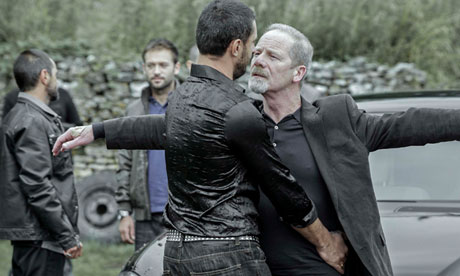The Fear (C4) | 4oD
The Town (ITV1) | ITV Player
A Young Doctor's Notebook (Sky Arts 1)
The Secret Life of Rubbish (BBC4) | iPlayer
Imagine Jeanette Winterson: My Monster and Me (BBC2) | iPlayer
Inside Claridge's (BBC2) | iPlayer
The Fear ran across four consecutive nights for a total of four hours. The question is whether that was two hours or three hours too long. Those who argue that it was four hours too long have a strong case, but that would be unfair to Peter Mullan, who gave a powerful performance in difficult circumstances.
He played Richie Beckett, a Brighton crime boss with fast-moving dementia. He went from administrative incompetence to hopeless incontinence in about as much time as it would have taken him to pull his trousers down. One moment he was losing control of his memory, the next he had lost control of his bowels.
But then he was under severe pressure from a new Albanian outfit dressed in that old Albanian outfit of black leather jackets, black shirts, black jeans and dark, mirthless faces.
Where would the modern crime drama be without swarthy eastern Europeans and their gangs of enslaved prostitutes? It's as though the main purpose of the genre was to characterise the Schengen Agreement as a charter for the free movement of psychotic pimps.
As if to prove the point, the Albanians cut off the head of one of their female slaves and left it in the bed of Beckett's feckless son. The obvious reference was the famous horse-head-in-the-bed scene in The Godfather – the key difference being that the horse was highly prized by its owner and no one, including the audience, cared about the girl.
If the brutality was intended as a comment on the disposable lives of exploited women, it looked more like the exploitation of a disposable female character. She was no less animated after her body was parted from her head than she had been before. Just as the colour code for eastern European pimps is unfailingly black, their trafficked victims are always a lifeless grey.
There was a girl that Richie cared about, someone in his past, but as his past was lost in the collapsing recesses of his mind, she became a faceless figure in a recurring flashback shot in the nightmarish style of a Prodigy video. The running time could have been cut in half if these interludes had been removed, and with no deleterious effects on the plot – not least because there was no plot to speak of.
Instead there was just Mullan cracking up for four nights. It was as if the heath scene in King Lear had been turned into a whole play, only set in modern-day Brighton, with lots of gratuitous shots of the beach. The sight of gangs of armed Albanians marauding through the genteel backdrop of the Lanes was a little odd and not entirely convincing, but perhaps not quite as odd as Richard E Grant's turn as a plastic surgeon thrust into the action.
With his ageless hair and devilishly untrustworthy expression, he looked the part, but the part never looked remotely related to the rest of the film. Directed by Michael Samuels, who made a superb adaptation of William Boyd's Any Human Heart, it never came close to establishing a comparable vision or coherence. The paradox of dramatising mental chaos is that it requires great narrative discipline, and for all Mullan's commendable efforts, The Fear was a sorry mess.
The town in The Town did not have a beach or trendy cafes or any of Brighton's attractions. It was platonically unremarkable, which lent an almost surreal normality to the proceedings. The three-part story began with a middle-aged couple going to bed in mundane fashion. The next morning the teenage daughter went into wake her parents and found them dead, apparently the result of a suicide pact.
There was no blood or gore, but it was a truly shocking scene, far more shocking, for example, than the bodiless head in The Fear, because there was a context and expectations were abruptly confounded. One half of the couple, after all, was Phil Davis. He's not the kind of actor who's written out in the first scene.
Neither the daughter (Avigail Tlalim) nor her grandmother (Julia McKenzie) seemed able to process what had happened, which left you wondering, out of genuine curiosity, where the story could go. Cue the return of the prodigal son (Andrew Scott), who had been living in London for a decade.
He had to convey grief, shock, social dislocation and suspicion, and managed them all without straining at any. Most impressive of all, he had enough screen presence to make you forgive, if not quite forget, his resemblance to the 1980s pop star Gary Numan.
There was also plenty going on in background, with minor characters who created not only an authentic community atmosphere but also the whiff of small-town machinations – many of which appeared to involve the mayor, enjoyably played by Martin Clunes.
With two parts to go, there's plenty of time for ritual disappointment, but this opener seemed to bring something of the unsettling flavour of Twin Peaks to an unprepossessing corner of England. In his first TV outing, the playwright Mike Bartlett may just have found the missing link between Bet and David Lynch.
The casting of different actors in the same part at separate stages of life is a tricky business. The aforementioned Any Human Heart was a rare success in this regard, with Sam Claflin, Matthew Macfadyen and Jim Broadbent stepping effortlessly into Logan Mountstuart's changing shoes. Whereas this year's White Heat was a case study in how not to do it, as we were asked to swallow the idea that Claire Foy's life had gone so far awry that she had somehow matured into Juliet Stevenson .
From a visual perspective, A Young Doctor's Notebook may owe more to the latter school of casting than the former, given that Daniel Radcliffe played the younger self of John Hamm – or to put it in popular and no less incredible terms, Harry Potter grew up to become Don Draper. Yet strangely the combination worked, in no small part owing to the pair sharing the same scenes.
In this adaptation of Mikhail Bulgakov's autobiographical short stories about life as a country doctor in pre-revolutionary Russia, Hamm played the older conscience offering sage advice to the fresh-faced graduate. The tone was knockabout bordering on slapstick, and while neither actor is a born comedian, together they made an entertaining double act.
If you thought waste management was a polite euphemism for gangland employment, then The Secret Life of Rubbish was a bracing corrective. The second part showed that refuge collection came of age in the postwar consumer boom, when disposability became a mark of affluence, the dark shadow, as one rubbish historian (or rather, historian of rubbish) called it, that we are forever trying to get rid of. The most haunting shot was of a fragment of a pulverised washing-up-liquid bottle. Forty years on it still refused to make its peace with nature.
There was the obligatory return-to-roots visit in Imagine… Jeanette Winterson: My Monster and Me when the novelist went back to her doorstep in Accrington. The monster was her adoptive mother, who frequently banished the young Winterson to that very doorstep.
"Some people know that they couldn't commit murder," observed Winterson. "But I am not one of those people."
Alan Yentob laughed nervously, as if in the presence of an Albanian gangster, and then changed the subject.











